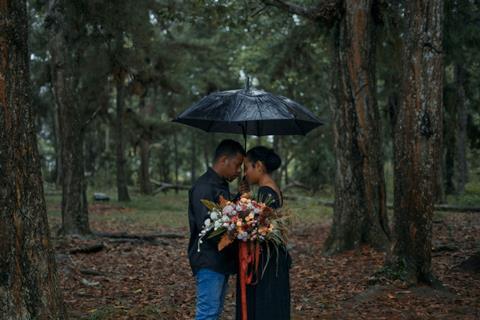‘I love that the Bible doesn’t pretend that grief doesn’t exist. In fact, it meets us right in the middle of it. Romans 12:15 says, “Mourn with those who mourn”—a reminder that marriage is about showing up emotionally, not retreating into yourself,’ says Salomé Criddle.

Recently, I found myself watching our twelve-year-old wedding video. Tears streamed down my face—not just from the joy I saw on screen, but from the weight of all we’ve lost since that day. As the camera scanned the room, I could see the beaming face of my grandma, the distinct and uninhibited laughter of a cousin, the quiet pride of my father in law. All of whom are no longer with us.
Over the years, we’ve both faced losses we never expected, and changes we never asked for
Over the years, we’ve both faced losses we never expected, and changes we never asked for. The pain has settled deep within us, ageing us in ways we couldn’t have imagined. Beyond that, it’s altered the dynamics of our marriage. We’ve had to grow more aware of the moments when one of us is crashing and burning, and learn to be gentle with the invisible bruises the other is carrying. Grief changes you. It just does. There’s no going back to who you were before.
READ MORE: Mothering without a mother: finding strength in God through grief
Some days I feel fine. Then out of nowhere, I’m crying again. A song, a scent, a passing thought, and I’m spiralling. What makes it harder is knowing I can’t pray it away. I can’t outrun the waves. I just have to ride them out and wait for the fog to lift. I know my husband understands, though his grief shows up differently. For him, it’s quiet, internal, often surfacing in a heaviness he can’t quite name. Father’s Day, Christmas, birthdays… they’ve all changed. We’ve learned to accept that those moments will never feel the same again. But what matters is that we keep talking about it, what it feels like, what we miss, and how it’s shaping us.
So, how do we stay married in the mourning? How do we make sure that grief doesn’t quietly unravel the very thing that once brought us joy?
So, how do we stay married in the mourning? How do we make sure that grief doesn’t quietly unravel the very thing that once brought us joy? Because the truth is, grief doesn’t just touch the one who’s lost someone, it touches the marriage too. It’s tough, but we’ve found that the only way forward is to communicate, even when the words are clumsy or come with tears. We’ve stopped expecting the other to “just know” how we’re doing. Guesswork only leads to silence, and silence builds walls. Simple honesty, even if it’s just, “Today is hard” can open doors we didn’t even know were closed. We also give each other permission to grieve differently. My tears don’t make me weak. His silence doesn’t make him distant. We’ve learned not to take it personally. Instead of trying to fix it, we’ve learned the power of just staying near.
READ MORE: Walking with Jesus through complex grief
As grief has reshaped the way we do life, we’ve created new rhythms to reflect where we are now. Special occasions needed to be rewritten. We started building our own gentle traditions—ways to honour who and what we’ve lost, while also giving ourselves space to smile again. And spiritually, we’ve had to hold each other up. On the days when one of us couldn’t bring ourselves to pray out loud, the other stepped in. We’ve prayed in the gaps, stood in faith for each other, and reminded ourselves that our connection to God doesn’t have to be perfect, it just has to be real.
READ MORE: Mariah Carey’s mother and sister died on the same day, how can we as Christians navigate such shocking grief?
I love that the Bible doesn’t pretend that grief doesn’t exist. In fact, it meets us right in the middle of it. Romans 12:15 says, “Mourn with those who mourn”, a reminder that marriage is about showing up emotionally, not retreating into yourself. It’s not about solving each other’s sadness, but entering into it as an act of love. Ecclesiastes 4:9–10 says, “Two are better than one…” and in marriage, that truth becomes painfully beautiful when one of us is too broken to stand. We carry each other when grief weakens our knees. And in Psalm 34:18, we’re told that “The Lord is close to the brokenhearted.” When words fail between us, when even prayers fall silent, we cling to that nearness. We trust that even in our private pain, we are never truly alone.
Grief has changed our marriage, but it hasn’t destroyed it. If anything, it’s drawn us closer to the heart of God and to one another. There are days we cry separately, and days we cry together. But through it all, we’re learning that mourning together is a sacred act of love, and choosing to stay, even in sorrow, is a daily act of faithfulness.

What Victoria Beckham taught me: why building a dream with your husband might be biblical
Women usually bear the burden at Christmas - from cooking to gifts - here’s how to navigate this time while actually enjoying it
Katie Price and cosmetic procedures: what can Christian women learn about when it is enough?



































No comments yet